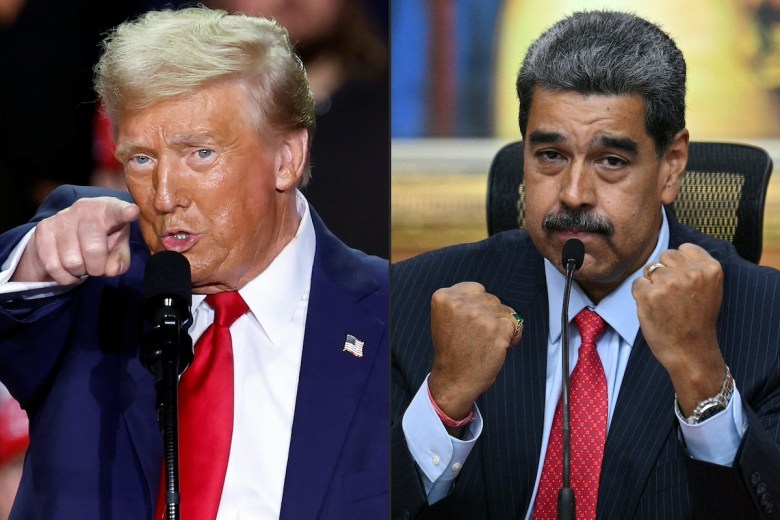Politics
U.S. Strategy on Venezuela Risks Unintended Consequences

The Trump administration is exploring military options against Venezuelan President Nicolás Maduro, raising concerns about the potential for unintended consequences. While no formal action has been approved, discussions regarding strikes against drug cartels in Venezuela are part of a broader strategy aimed at weakening Maduro’s regime. This evolving situation reflects an increasing pressure on Venezuela without a clear plan for what comes next.
Strategic Framing and Underlying Confusion
The U.S. has framed its approach to Venezuela through the lens of counternarcotics and counterterrorism, rather than explicitly advocating for regime change. Marco Rubio, Secretary of State and a key proponent of this hardline stance, views the Venezuelan crisis through his Cuban-American perspective. He argues that Maduro’s survival is buoyed by Cuban intelligence and that Venezuelan oil supports Cuba’s economy. In this context, ousting Maduro is seen as the first step in stabilizing the region.
Yet, there is a significant contradiction in the U.S. stance. Donald Trump has publicly denied seeking regime change, even as military assets gather off the Venezuelan coast. This inconsistency raises questions about U.S. objectives: Is the goal to compel Maduro to negotiate his exit, facilitate a military coup, or instigate a popular uprising through economic collapse? The lack of clarity could lead to miscalculations.
Potential Consequences of Regime Change
The aftermath of regime change poses a critical challenge. Unlike Iraq or Libya, Venezuela’s situation is complicated by its oil wealth and weak institutions. The opposition, although legitimate in its electoral claims, remains fragmented and largely in exile. The military leadership is heavily involved in narcotrafficking, complicating any potential transition to a stable government.
Moreover, current U.S. strategies could inadvertently bolster Maduro’s position. He is expected to declare a state of emergency and mobilize civic-military forces, framing external pressure as imperial aggression. History suggests that such tactics often reinforce authoritarian regimes, as seen in countries like Cuba, Iran, and North Korea.
The irony of this situation is striking. Trump’s administration has campaigned on stemming immigration from Venezuela, promising to deport criminal elements. Yet, further destabilization—whether through military action, economic sanctions, or support for regime collapse—will likely exacerbate the very migration crisis the administration seeks to mitigate. Venezuela has already produced over seven million refugees and migrants, and a state collapse could double that figure, placing immense strain on neighboring countries like Colombia and Brazil.
Realism demands that U.S. policymakers confront uncomfortable realities. First, while Maduro’s regime is undoubtedly corrupt and unpopular, it does not pose an immediate threat to U.S. national security. Second, U.S. leverage is limited; recent sanctions have further constricted foreign operations in Venezuela, particularly with a May 27, 2023 deadline for oil companies to exit. As pressure mounts, military action risks escalating a manageable situation into a regional crisis.
Ultimately, the Trump administration must clarify its objectives regarding Venezuela. If the focus is on narcotics trafficking, there are more effective strategies than military intervention, which could scatter cartel operations and incite further violence. If the aim is to promote democracy, history indicates that military interventions frequently undermine democratic processes.
The administration now faces a critical choice: continue with escalating pressure, risking a chaotic regime change, or pivot towards a more transactional approach. This revised strategy would prioritize targeted engagements that address specific goals, such as counternarcotics cooperation, migration management, and gradual economic normalization in exchange for verifiable concessions from the Maduro regime.
While such engagement may feel distasteful and could imply legitimizing an authoritarian government, realism often involves navigating difficult choices. The real tragedy lies in the potential for the Trump administration to drift into regime change without a clear plan for the aftermath. If the U.S. is serious about avoiding prolonged commitments, it should carefully reconsider its approach to Venezuela, keeping in mind the complexities of the situation and the needs of its people. An effective strategy should prioritize the welfare of Venezuelans over geopolitical posturing, acknowledging that they deserve better than both Maduro and a potential U.S. foreign policy disaster.
-

 Business5 months ago
Business5 months agoKenvue Dismisses CEO Thibaut Mongon as Strategic Review Advances
-

 Lifestyle4 months ago
Lifestyle4 months agoHumanism Camp Engages 250 Youths in Summer Fest 2025
-

 Sports4 months ago
Sports4 months agoDe Minaur Triumphs at Washington Open After Thrilling Comeback
-

 Sports5 months ago
Sports5 months agoTupou and Daugunu Join First Nations Squad for Lions Clash
-

 Top Stories5 months ago
Top Stories5 months agoColombian Senator Miguel Uribe Shows Signs of Recovery After Attack
-

 World5 months ago
World5 months agoASEAN Gears Up for Historic Joint Meeting of Foreign and Economic Ministers
-

 Health4 months ago
Health4 months agoNew Study Challenges Assumptions About Aging and Inflammation
-

 Business5 months ago
Business5 months agoOil Prices Surge Following New EU Sanctions on Russia
-

 Entertainment4 months ago
Entertainment4 months agoDetaşe-Sabah Violin Ensemble Captivates at Gabala Music Festival
-

 Entertainment4 months ago
Entertainment4 months agoBaku Metro Extends Hours for Justin Timberlake Concert
-

 Top Stories5 months ago
Top Stories5 months agoRethinking Singapore’s F&B Regulations Amid Business Closures
-

 Business5 months ago
Business5 months agoU.S. House Approves Stablecoin Bill, Sends to Trump for Signature









